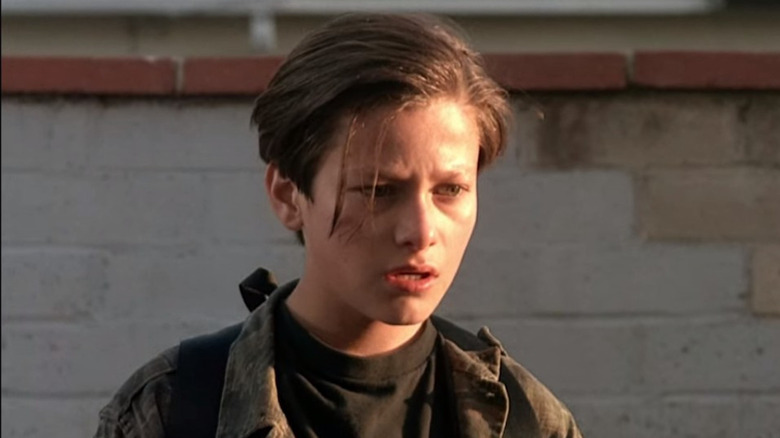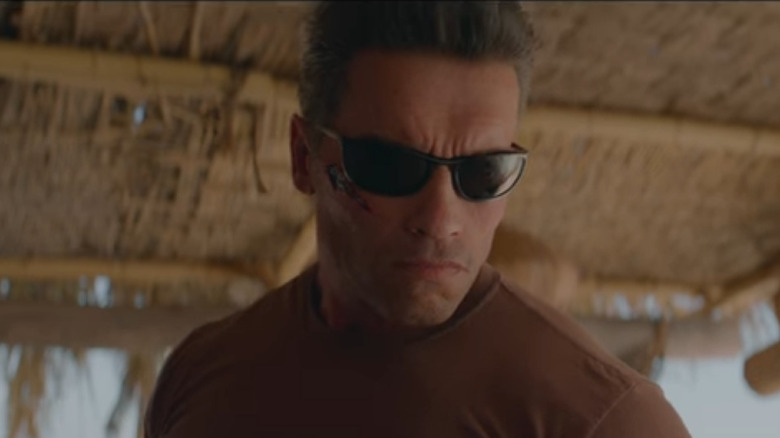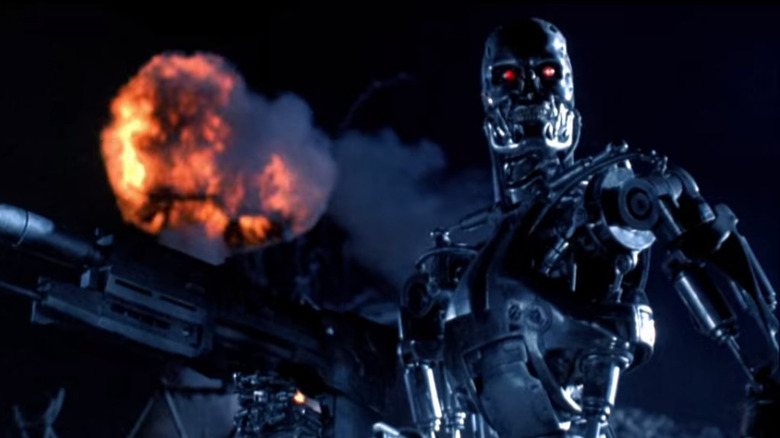Why Did The Terminator Kill John Connor - And Why Was It So Controversial?
When you think of James Cameron and his film franchises, you have many to choose from. "Avatar" is the newest and the one most people would probably think of nowadays. But as a writer, producer, and director, he has been involved with franchises like "Alien," "Rambo," "Dark Angel," and movies like "True Lies," "Titanic," and "The Abyss." But perhaps one of his most successful and beloved franchises is "The Terminator." While he stepped away for years, Cameron returned to kill off his main character in the newest movie's first few minutes, a controversial decision that sparked considerable backlash and was completely intentional.
While some may assume that the studio was looking to restart the franchise by killing off the creator's mainstay and separating itself to start anew, Cameron revealed in a roundtable with the press interview (via IGN) that it was his idea to kill him off in 2019's "Terminator: Dark Fate." "The idea that we whack John in the first 30 seconds," the legendary director said. "That was my idea. I said, 'If we really want to surprise the audience and we want to get everybody off balance ...'" He went on to tell everyone that he meant to throw fans off.
"It's like we've invested so much across the first two films and then to some degree or other in the subsequent ones that I wasn't involved with, in this whole John Connor mythology," Cameron said. "It's like, 'Let's just get that right off the table. Let's just pull the carpet out from underneath all of our assumptions of what a Terminator movie is going to be about. Let's just put a bullet in his head at a pizzeria in the first 45 seconds.'"
Why killing John Connor was controversial
The core of "The Terminator" franchise has always been built around the necessary survival of John Connor (Edward Furlong) so he can eventually lead the humans in the resistance against the machines. After decades of writing movies that show him and his family and friends defying odds by surviving numerous assassination attempts by the machines, it was jarring to watch a new Terminator so easily walk up to him in a tiki bar with Sarah Connor (Linda Hamilton) looking on and dispatch him unceremoniously.
The result was a storyline that mirrored the original, only with a female savior of humanity and protector. This approach was not universally loved by fans. A Reddit thread asking them to weigh in caused a mixed reaction, with one deleted user stating, "My personal opinion was that it was a stupid idea. It completely destroyed everything that this franchise had built, and it felt like a waste." Another user, u/SparkG, echoed the displeasure by explaining further. "I would've liked it if the rest of the story wasn't literally about another John Connor. Why kill him if you're doing the same exact thing over again?" u/Almighty_Push91 added a short and sweet comment that tied the whole issue up. "Nope. Made T2 useless."
It wasn't all hate for the franchise creator's decision; some users found love for the path he took. u/Dispositionpsn showed support, "It worked; I totally never expected it." Other comments praised Cameron for having the guts to kill off Connor but criticized the rest of the movie for not following through by trying something different, instead electing to repeat the same storyline the franchise used over and over.
What if the machines win?
So the question posed to the audience when the machines actually succeed at the goal they have been chasing for decades is, what next? What happens when the machines finally kill John Connor? The answer to that question is the reason "Dark Fate" struggled to connect with its audience. There are only two outcomes that are possible with the death of Connor.
First, the most obvious outcome is that the machines win the war against the humans. While the villain triumphing over the hero is a bold idea that can leave audiences completely rattled, we always expect the hero to be victorious and the balance of the world to be restored at the end of a story. But when the villain wins, it can remind us that the world isn't fair. It robs us of the escapism. If it is done well, it can be highly effective, like "Fight Club" or "Se7en."
The second outcome is that the humans still win. While this is a safe outcome for the sake of our mental state, it creates one massive problem. If the humans can still win without their valuable savior Connor, what have we been doing for the last half-a-dozen movies? Killing Connor at the beginning of "Terminator: Dark Fate" was a creative decision that could have turned out extremely well if there had been a unique storyline following it. Unfortunately, simply retconning the same storyline after his death essentially tells us that it doesn't matter if the heroes protect the new chosen one; another one is likely right behind them anyway, robbing us of the very stakes the "Terminator" franchise has always had.


